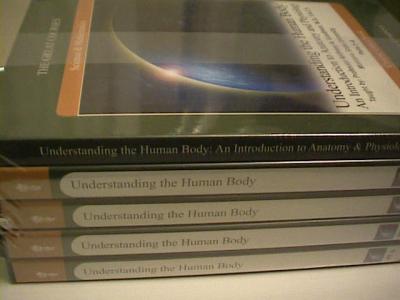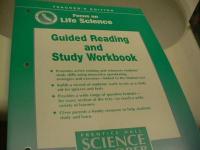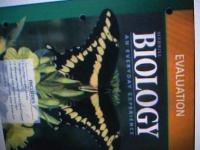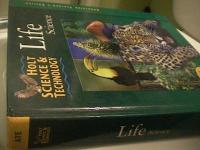ID # 512-9007-08
priority mail shipping with tracking and with insurance. (3-5 business days to arrive) daily shipping.
VALUE $519.95. opened to check the contents only. almost new. course guidebook included. the item is not for resale. the sale is final.
Course No. 160 (32 lectures, 45 minutes/lecture)
Publisher: Teaching Company,
Pub date: 2004.
Pages: 8 pcs instructional DVD (1440 min.) :
Taught by Anthony A. Goodman
Montana State University
M.D., Cornell Medical College
Course Lecture Titles
1. Cardiovascular System—Anatomy of the Heart
2. Cardiovascular System—Physiology of the Heart
3. Cardiovascular System—Anatomy of the Great Vessels
4. Cardiovascular System—Physiology of the Great Vessels
5. Respiratory System—Anatomy of the Lungs
6. Respiratory System—Physiology of the Lungs
7. Nervous System—Anatomy of the Brain
8. Nervous System—Physiology of the Brain
9. Nervous System—Spinal Cord and Spinal Nerves
10. Nervous System—Autonomic Nervous System and Cranial Nerves
11. Nervous System—The Eyes
12. Nervous System—The Ears, Hearing, and Equilibrium
13. Nervous System—Memory
14. Digestive System—Anatomy of the Mouth, Esophagus, and Stomach
15. Digestive System—Physiology of the Mouth, Esophagus, and Stomach
16. Digestive System—Anatomy of the Pancreas, Liver, and the Biliary Tree
17. Digestive System—Physiology of the Pancreas, Liver, and the Biliary Tree
18. Digestive System—Anatomy of the Small Intestine, Colon, and Rectum
19. Digestive System—Physiology of the Small Intestine, Colon, and Rectum
20. Endocrine System—The Pituitary and Adrenal Glands
21. Endocrine System—Pancreas
22. Endocrine System—Thyroid and Parathyroid Glands
23. Urinary System—Anatomy of the Kidneys, Ureters, and Bladder
24. Urinary System—Physiology of the Kidneys, Ureters, and Bladder
25. Reproductive System—Male
26. Reproductive System—Female
27. Reproductive System—Physiology of Genetic Inheritance
28. Musculoskeletal System—Physiology and Physics of the Muscles
29. Musculoskeletal System—Anatomy of the Muscles
30. Musculoskeletal System—Bones
31. Immune System—Anatomy and Physiology
32. The Biology of Human Cancer
==============================================
What You Learn
Cardiovascular System: The course opens with the cardiovascular system, focusing on the heart in Lectures 1 and 2. You examine its different parts, their responsibilities, and how the processes can break down. Lectures 3 and 4 complete the cardiovascular system with descriptions of the anatomy and physiology of the great vessels of the body, including arteries, veins, and their relationships.
Respiratory System: Tied directly to the structure and function of the heart and great vessels is the respiratory system—covered in Lectures 5 and 6, which address the anatomy and physiology of the lungs.
Nervous System: The lectures continue with a look at the very reason for the existence of all the other organ systems: the nervous system. Lectures 7 and 8 explore the structure and function of the brain itself. Lecture 9 covers the anatomy and physiology of the spinal cord and the spinal nerves. Lecture 10 addresses the unconscious workings of the autonomic nervous system and all-important cranial nerves. In Lecture 11, you learn about the wonders of sight and the eye. In Lecture 12, you study the ears, hearing, and balance. Lecture 13 ends the discussion of the nervous system by examining memory, brain pathology, anesthesia, and pain.
Digestive System: Lectures 14 and 15 examine the anatomy and physiology of the upper portion of the gastrointestinal tract—the mouth, esophagus, and stomach—continuing in Lectures 16 and 17 with the pancreas, liver, and the biliary tree. In Lectures 18 and 19 you learn about the anatomy and physiology of the small intestine, colon, and rectum.
Endocrine System: Dr. Goodman devotes three lectures to the endocrine system. In Lecture 20, you study the anatomy and physiology of the pituitary gland and the adrenal glands, then move on to cover the anatomy and physiology of the endocrine pancreas in Lecture 21. In Lecture 22, Dr. Goodman completes the analysis of the endocrine system with a look at the anatomy and physiology of the thyroid gland and the parathyroid glands.
Urinary System: Lectures 23 and 24 focus on the kidneys, ureters, and bladder.
Reproductive System: In Lectures 25 and 26, Dr. Goodman discusses the anatomy and physiology of the male and female reproductive systems. Lecture 27 covers genetic inheritance and its potential problems.
Musculoskeletal System: The next topic is the musculoskeletal system. Lecture 28 looks at the physiology and physics of the muscles. In Lecture 29, you examine the anatomy of specific muscle groups. Lecture 30 focuses on the anatomy and physiology of the skeleton.
Immune System: Lecture 31 addresses the structure and function of the body's major defense mechanism, the immune system.
Cancer: The course ends with a lecture on the biology of human cancer.
the sale is final.
priority mail shipping with tracking and with insurance. (3-5 business days to arrive) daily shipping.
VALUE $519.95. opened to check the contents only. almost new. course guidebook included. the item is not for resale. the sale is final.
Course No. 160 (32 lectures, 45 minutes/lecture)
Publisher: Teaching Company,
Pub date: 2004.
Pages: 8 pcs instructional DVD (1440 min.) :
Taught by Anthony A. Goodman
Montana State University
M.D., Cornell Medical College
Course Lecture Titles
1. Cardiovascular System—Anatomy of the Heart
2. Cardiovascular System—Physiology of the Heart
3. Cardiovascular System—Anatomy of the Great Vessels
4. Cardiovascular System—Physiology of the Great Vessels
5. Respiratory System—Anatomy of the Lungs
6. Respiratory System—Physiology of the Lungs
7. Nervous System—Anatomy of the Brain
8. Nervous System—Physiology of the Brain
9. Nervous System—Spinal Cord and Spinal Nerves
10. Nervous System—Autonomic Nervous System and Cranial Nerves
11. Nervous System—The Eyes
12. Nervous System—The Ears, Hearing, and Equilibrium
13. Nervous System—Memory
14. Digestive System—Anatomy of the Mouth, Esophagus, and Stomach
15. Digestive System—Physiology of the Mouth, Esophagus, and Stomach
16. Digestive System—Anatomy of the Pancreas, Liver, and the Biliary Tree
17. Digestive System—Physiology of the Pancreas, Liver, and the Biliary Tree
18. Digestive System—Anatomy of the Small Intestine, Colon, and Rectum
19. Digestive System—Physiology of the Small Intestine, Colon, and Rectum
20. Endocrine System—The Pituitary and Adrenal Glands
21. Endocrine System—Pancreas
22. Endocrine System—Thyroid and Parathyroid Glands
23. Urinary System—Anatomy of the Kidneys, Ureters, and Bladder
24. Urinary System—Physiology of the Kidneys, Ureters, and Bladder
25. Reproductive System—Male
26. Reproductive System—Female
27. Reproductive System—Physiology of Genetic Inheritance
28. Musculoskeletal System—Physiology and Physics of the Muscles
29. Musculoskeletal System—Anatomy of the Muscles
30. Musculoskeletal System—Bones
31. Immune System—Anatomy and Physiology
32. The Biology of Human Cancer
==============================================
What You Learn
Cardiovascular System: The course opens with the cardiovascular system, focusing on the heart in Lectures 1 and 2. You examine its different parts, their responsibilities, and how the processes can break down. Lectures 3 and 4 complete the cardiovascular system with descriptions of the anatomy and physiology of the great vessels of the body, including arteries, veins, and their relationships.
Respiratory System: Tied directly to the structure and function of the heart and great vessels is the respiratory system—covered in Lectures 5 and 6, which address the anatomy and physiology of the lungs.
Nervous System: The lectures continue with a look at the very reason for the existence of all the other organ systems: the nervous system. Lectures 7 and 8 explore the structure and function of the brain itself. Lecture 9 covers the anatomy and physiology of the spinal cord and the spinal nerves. Lecture 10 addresses the unconscious workings of the autonomic nervous system and all-important cranial nerves. In Lecture 11, you learn about the wonders of sight and the eye. In Lecture 12, you study the ears, hearing, and balance. Lecture 13 ends the discussion of the nervous system by examining memory, brain pathology, anesthesia, and pain.
Digestive System: Lectures 14 and 15 examine the anatomy and physiology of the upper portion of the gastrointestinal tract—the mouth, esophagus, and stomach—continuing in Lectures 16 and 17 with the pancreas, liver, and the biliary tree. In Lectures 18 and 19 you learn about the anatomy and physiology of the small intestine, colon, and rectum.
Endocrine System: Dr. Goodman devotes three lectures to the endocrine system. In Lecture 20, you study the anatomy and physiology of the pituitary gland and the adrenal glands, then move on to cover the anatomy and physiology of the endocrine pancreas in Lecture 21. In Lecture 22, Dr. Goodman completes the analysis of the endocrine system with a look at the anatomy and physiology of the thyroid gland and the parathyroid glands.
Urinary System: Lectures 23 and 24 focus on the kidneys, ureters, and bladder.
Reproductive System: In Lectures 25 and 26, Dr. Goodman discusses the anatomy and physiology of the male and female reproductive systems. Lecture 27 covers genetic inheritance and its potential problems.
Musculoskeletal System: The next topic is the musculoskeletal system. Lecture 28 looks at the physiology and physics of the muscles. In Lecture 29, you examine the anatomy of specific muscle groups. Lecture 30 focuses on the anatomy and physiology of the skeleton.
Immune System: Lecture 31 addresses the structure and function of the body's major defense mechanism, the immune system.
Cancer: The course ends with a lecture on the biology of human cancer.
the sale is final.
01693
Payment Methods
Shipping
$10.50
Payment Policy
We are on vacation from Jan 15 to Feb 16. Email to ask for the paypal link.
Shipping Policy
ship to US Address ONLY.
Return/Exchange Policy
no return.
Other Policies
We are on vacation from Jan 15 to Feb 16. Email to ask for the PayPal link.
Please Login or Register first before asking a question.



































